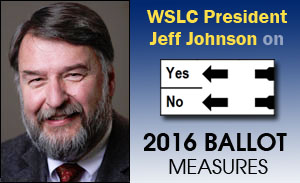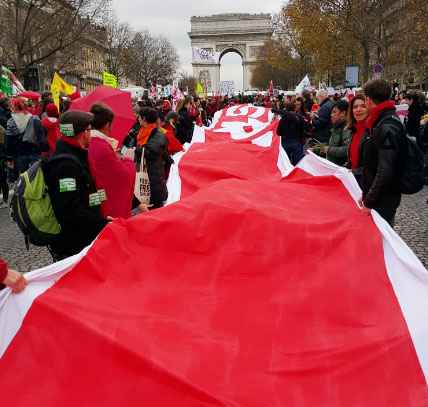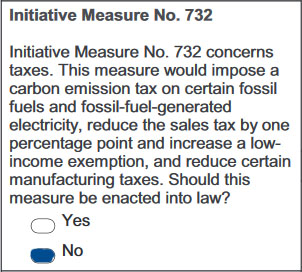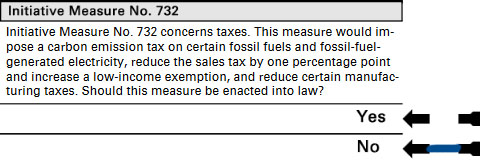ELECTION
NO on I-732: It’s a giant misstep on climate
 By JEFF JOHNSON
By JEFF JOHNSON
One in a series of columns on ballot measures
(Oct. 7, 2016) — Initiative 732, the carbon tax measure on November’s ballot, is opposed or not supported by the labor movement, communities of color and social justice organizations, most environmental organizations, businesses, the Washington State Democratic Party, the Washington State Republican Party, and many others.
Why is that?
For most of us, it is not because it puts a price on carbon. It’s because it does it the wrong way.
I-732 is a giant misstep and the climate crisis that we face is so serious that we need to get the policy right the first time. I-732 is a “pass-it-now, fix-it-later” experiment that we cannot afford.
 Last December, I had the honor of being part of the labor delegation to the United Nations Climate Talks in Paris. What became very clear, very quickly was that we are at a crisis point on our planet, not to mention our nation and our state. The increasing severity of storms, droughts, glacial melt, flooding, rising sea levels, and ocean acidification are inflicting great human and economic losses around the world. But what also became clear is that while urgency is required to address climate disasters, not all climate policies are equal and some can set us back.
Last December, I had the honor of being part of the labor delegation to the United Nations Climate Talks in Paris. What became very clear, very quickly was that we are at a crisis point on our planet, not to mention our nation and our state. The increasing severity of storms, droughts, glacial melt, flooding, rising sea levels, and ocean acidification are inflicting great human and economic losses around the world. But what also became clear is that while urgency is required to address climate disasters, not all climate policies are equal and some can set us back.
An effective climate policy must significantly reduce carbon emissions. This requires forward thinking climate policy that places a cap on emissions, puts a price on emissions, and uses positive revenue from carbon pricing to invest in clean energy, energy efficiency, and infrastructure development that mitigates the impacts of climate change. I-732 doesn’t do this.
Simply putting a price on carbon, while making it more costly to pollute and raising the price of fossil fuels, doesn’t, by itself, effectively reduce emissions when prices can be passed on to consumers and polluters can move jobs and pollution elsewhere. The point of effective climate policy is to give us better alternatives so that we need less fossil fuel. Without investment in affordable clean energy, we just pay more for what we have instead of making the transition to a clean energy economy. Without a cap on emissions and investments in clean energy, we don’t lower emissions enough or at a pace quick enough to protect our planet.
 Putting a price on carbon emissions without recognizing the efforts by energy-intensive trade exposed (EITE) industries to reduce their carbon emissions per unit of output punishes these businesses for trying to do the right thing. It incentivizes what economists call “leakage.” Put simply, “leakage” means moving jobs and pollution out of state. This doesn’t help the climate, and it creates lost jobs, lower income and lost revenues to fund communities. An effective climate policy helps our industries to continue to become as energy efficient as technologically possible and to continue providing family wage supporting union jobs.
Putting a price on carbon emissions without recognizing the efforts by energy-intensive trade exposed (EITE) industries to reduce their carbon emissions per unit of output punishes these businesses for trying to do the right thing. It incentivizes what economists call “leakage.” Put simply, “leakage” means moving jobs and pollution out of state. This doesn’t help the climate, and it creates lost jobs, lower income and lost revenues to fund communities. An effective climate policy helps our industries to continue to become as energy efficient as technologically possible and to continue providing family wage supporting union jobs.
Just as carbon pricing alone won’t lower emissions enough to save our planet, we can’t rely on private investments alone to make the transition to a clean energy economy quickly enough to stem climate disaster from continued fossil fuel consumption. As long as the Koch brothers and others can profit greatly from oil and natural gas production, the alternative energy parts of their financial portfolio will be slow to grow.
 We need carbon pricing that produces positive revenue that is then invested in clean energy alternatives, deep-dive energy efficiency, and infrastructure for the clean energy economy and to mitigate the negative impacts of climate change. To achieve the climate goals set out in Paris, we need to both cut the use of fossil fuels and increase investments in clean energy. I-732 fails to do this.
We need carbon pricing that produces positive revenue that is then invested in clean energy alternatives, deep-dive energy efficiency, and infrastructure for the clean energy economy and to mitigate the negative impacts of climate change. To achieve the climate goals set out in Paris, we need to both cut the use of fossil fuels and increase investments in clean energy. I-732 fails to do this.
I-732, conceived to be revenue-neutral, fails at revenue neutrality — it cuts state funding for schools and service by nearly $800 million over its first six years — and it fails to recognize that it will require public investment to help leverage the clean energy economy.
In the 2017-2019 budget cycle, Washington state faces a $5 billion to $10 billion deficit. Put another way, we don’t raise enough revenue to pay for one-eighth to one-quarter of our state’s needs. I-732 makes this problem worse. This pits education, child care, health, public safety, environmental needs, and the wages and benefits of public employees against one another.
Compounding this problem, I-732 make’s changes to our tax structure that make it more difficult for the Legislature to agree upon how to come up with enough revenue to close the deficit. If I-732 passes, the adjusted sales and B&O taxes will be off the table for years and the incentive for Republicans to negotiate increased revenue is removed.
In order to create long-term sustainable and successful climate policy, we have to generate a broad base of support. We earn broad-based support when people can see fair and just policies that don’t leave them or their communities behind. We earn broad support when investments in clean energy are made in communities most affected by pollution, climate change, and the transition from fossil fuels. We earn broad support for climate policy when we create a “Just Transition” towards a clean energy economy.
 Unfortunately, I-732 doesn’t do any of this. Simply pricing carbon does not guarantee that carbon emissions are reduced enough or in a manner that protects workers or communities. Instead, it locks us into tax structure and a way of thinking about climate policy that is inadequate and will be very difficult to fix in the future.
Unfortunately, I-732 doesn’t do any of this. Simply pricing carbon does not guarantee that carbon emissions are reduced enough or in a manner that protects workers or communities. Instead, it locks us into tax structure and a way of thinking about climate policy that is inadequate and will be very difficult to fix in the future.
We need a climate policy that generates a broad base of support. We need a climate policy that significantly reduces carbon emissions by capping carbon emissions, prices carbon emissions with appropriate compliance flexibility for EITEs, and reinvests revenue raised through the carbon fees in clean energy, energy efficiency, and infrastructure investments that further reduce carbon emissions while prioritizing communities and populations disproportionately impacted by pollution.
Labor, communities of color and environmental organizations are building a climate policy that does these things through building a broad-based coalition in the Alliance for Jobs and Clean Energy. We have begun a Climate Tour in Washington state building support for such a policy.
In the meantime, it is important that we support other initiatives that create family-wage supporting jobs and lower carbon emissions like the Regional Proposition 1 (Sound Transit 3), Proposition 1 – Buses Now in Spokane, deep-dive energy retrofits in Seattle through the MEETS program, and the IBEW solar test farm near the Hanford reservation.
The climate crisis is serious enough that we have to get climate policy right the first time. I-732 gets it wrong. Please vote NO on I-732.
Jeff Johnson is President of the Washington State Labor Council, AFL-CIO, the largest labor organization in the Evergreen State, representing the interests of more than 600 local unions and approximately 450,000 rank-and-file union members. This is one in a series of columns by Johnson about state and local ballot measures for 2016.





